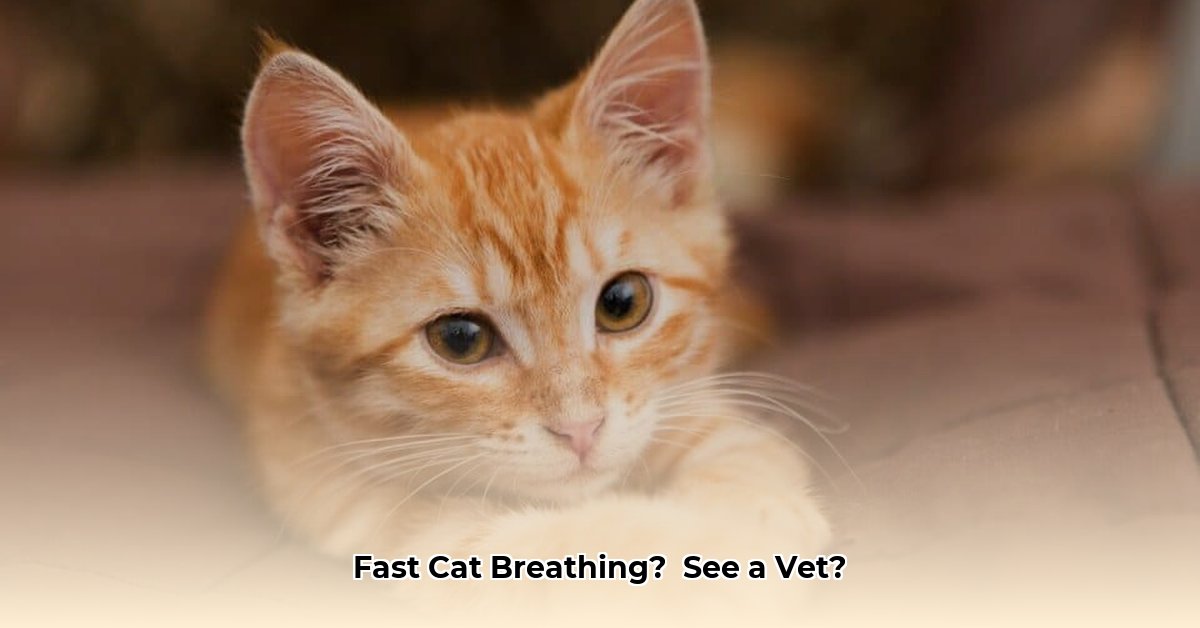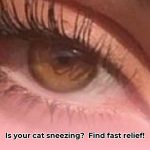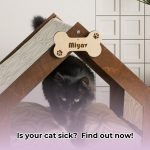Is your cat breathing a bit fast? It’s natural to be concerned. This guide will help you determine if your cat’s rapid breathing is a cause for concern, how to check their breathing rate, what’s normal, and when it’s time to see a vet.
Understanding Your Cat’s Breathing
First, let’s establish what “normal” breathing looks like in a cat.
How to Measure Your Cat’s Breathing Rate
- Find a Quiet Moment: Choose a time when your cat is relaxed and resting, ideally while they’re asleep (but not purring, as this can skew the count).
- Observe Their Chest: Gently watch the rise and fall of your cat’s chest. Each complete rise and fall counts as one breath.
- Count for 30 Seconds: Use a timer or watch and count the breaths for 30 seconds.
- Double the Number: Multiply the number of breaths you counted by two to get the breaths per minute.
A healthy, relaxed cat typically breathes between 15 and 30 times per minute. Some vets suggest a range up to 40 breaths per minute can be normal, especially if the cat isn’t deeply asleep. Keep in mind that each cat is an individual, and their normal rate might vary slightly. Regularly checking your cat’s breathing will help you establish their typical baseline.
Recognizing Rapid Breathing and When to Worry
Is Rapid Breathing Ever Normal?
Yes, sometimes. Just like us, cats breathe faster when excited, playing, stressed, or hot. A quick burst of speed chasing a toy or a trip to the vet are perfectly valid reasons for a temporary increase in breathing rate. Context is key.
When is Rapid Breathing a Concern?
Rapid breathing, or tachypnea, becomes concerning when it occurs while your cat is at rest. More than 40 breaths per minute while resting is generally considered tachypnea. However, it’s essential to consider accompanying symptoms:
- Open-mouth breathing (panting): This is unusual in cats and suggests they are struggling to get enough oxygen.
- Labored breathing: Visible effort with each breath, often involving the abdomen.
- Pale or bluish gums: This indicates a lack of oxygen and requires immediate veterinary attention.
- Lethargy or weakness: Unusual tiredness combined with rapid breathing could signal a more serious issue.
- Other symptoms: Coughing, wheezing, sneezing, discharge from the eyes or nose, changes in appetite, restlessness, or vocalization.
Potential Causes of Rapid Breathing in Cats
Several factors can cause rapid breathing in cats, from relatively benign to life-threatening:
| Potential Cause | Possible Symptoms (Besides Rapid Breathing) | When to Worry |
|---|---|---|
| Asthma/Bronchitis | Wheezing, coughing, difficulty breathing | If frequent or severe |
| Heart Conditions (Disease/Failure) | Lethargy, weakness, bluish gums, coughing, fluid buildup | Always |
| Stress/Anxiety | Hiding, pacing, trembling, loss of appetite, excessive grooming | If prolonged or excessive |
| Heatstroke | Panting, excessive drooling, vomiting, staggering, seeking cool surfaces | Always |
| Infection (viral, bacterial, fungal) | Sneezing, discharge from eyes or nose, fever, lethargy, loss of appetite | If worsening or persistent |
| Pain | Vocalization, restlessness, changes in behavior | Depends on severity and duration |
| Poisoning | Vomiting, diarrhea, tremors, seizures | Always |
| Anemia | Pale gums, weakness, lethargy | Always |
| Trauma (e.g., chest injury) | Bleeding, swelling, limping, bruising, difficulty breathing | Always |
| Fluid in the Lungs (Pleural Effusion) | Labored breathing, coughing, weakness, decreased appetite | Always |
| Obesity | Difficulty breathing, especially during activity | If impacting quality of life |
Further Explanation of Key Causes
- Asthma: Feline asthma is an inflammatory condition that narrows the airways, making breathing difficult. Allergies are suspected to play a role, though research is ongoing.
- Heart Problems: Conditions like heart disease and heart failure can lead to fluid buildup in the lungs, hindering breathing and increasing respiratory rate.
- Stress and Anxiety: These can trigger physiological responses, including rapid breathing. While often temporary, prolonged stress can negatively impact health.
What to Do If Your Cat Is Breathing Rapidly
- Stay Calm and Observe: Assess the situation. Is your cat acting normally otherwise? If the rapid breathing is short-lived and linked to a clear cause (like playtime), it may resolve on its own.
- Monitor for Other Symptoms: Watch for any of the red flags mentioned earlier.
- Contact Your Vet: If the rapid breathing persists, worsens, or is accompanied by other symptoms, contact your vet immediately. Provide them with a thorough description of your cat’s behavior and any other observed symptoms.
- Never Self-Medicate: Do not give your cat any human medications without consulting your vet, as these can be harmful or even fatal.
Preventative Care for Feline Respiratory Health
- Regular Veterinary Checkups: These can help detect potential problems early.
- Maintain a Healthy Weight: Obesity can strain the respiratory system.
- Provide a Clean Environment: Minimize exposure to irritants like dust, smoke, and strong chemicals.
- Manage Stress: A calm environment can contribute to better respiratory health.
- Consider Breed-Specific Predispositions: Some breeds may be more prone to certain respiratory conditions. Discuss this with your vet.
Disclaimer: This information is for general knowledge and does not substitute professional veterinary advice. Always consult your veterinarian if you are concerned about your cat’s health.
- Feline Sneezing & Watery Eyes: Vet Guide for Fast Relief - July 6, 2025
- Spot Feline Parvo Symptoms: Fast Diagnosis Guide - July 6, 2025
- Feline Melatonin: Safe Dosage Guide for Cats - July 6, 2025










